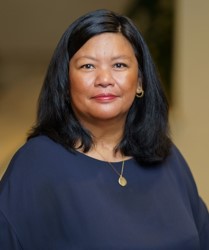Like many young people across the United States, she is eager to vote for the first time in November. She wants to have a voice in the democratic process because she - like her peers - has witnessed and experienced the myriad ways in which extremist forces seek to restrict voting, assail the rights of Black and Brown communities, and fracture our multiracial society. Young people like my daughter understand, however, that voting is only one response to these forces. This is why so many of them are engaged in and committed to cross-racial, -class and -gender solidarity work, seeking to build power across communities, issues, and movements.
At GCIR, we also believe that investing in these kinds of solidarity efforts is essential to building, strengthening, and protecting a multi-racial democracy. That is why, in a year of highly contested and consequential national elections, we have designed and implemented democracy-related grantmaking and programming on multiple fronts. Earlier this year we launched the State and Local Democracy Project to invest in immigrant- and refugee-led organizations in Texas, Michigan, Nevada, and Louisiana that are working on civic engagement, electoral, and democracy-focused issues. These states were chosen due to their unique qualities as either electoral swing states or under-the-radar, hard-to-count voting regions.
Our choices have been guided by GCIR’s State and Local Framework, which serves as a roadmap for GCIR’s efforts to broaden and deepen our commitment to mobilizing philanthropy across the country to advance the priorities of the immigrant justice movement. For this inaugural round of grantmaking, we have invested in organizations engaged in a wide range of democracy-focused efforts, including:
- Voter outreach and education
- Electoral protection and defense
- Youth voter turnout
- Digital and multilingual voter outreach
- Addressing disinformation and misinformation in the electoral process
The nine organizations selected for our initial round of grantmaking represent the breadth and depth of GCIR’s civic engagement scope. They are overwhelmingly women-led, youth-led, and BIPOC-led and -serving organizations, and have a proven track record of building power in rural, suburban, and urban areas. These groups are using a variety of approaches, from direct services to organizing, policy advocacy, base building, cultural activism, and narrative change. We are excited to share that the initial five partner organizations taking part in this project include Este Poder, Somos Tejas, Michigan United, Progressive Leadership Alliance of Nevada (PLAN), and Louisiana Organization for Refugees and Immigrants (LORI). Stay tuned for more information about the full list of organizations that make up this docket.
GCIR intends to leverage this initial investment to activate additional local and national dollars, both to support near-term voter mobilization and engagement and to achieve the following long-term outcomes:
- Fortify the immigrant justice movement’s power-building efforts in Texas, Michigan, Nevada, and Louisiana.
- Amplify pro-democracy efforts and narratives that center immigrant voices, stories, and experiences.
- Strengthen cross-sector learning and collaboration among stakeholders based in those target states.
In addition to our grantmaking, we have led several election scenario planning programs and conversations, including two webinars this past July that focused on why investing in immigrant and refugee communities is critical to building a multi-racial democracy and how funders can strategically deploy resources both pre- and post-election.
We will continue these conversations about the election and broader democracy-building efforts at our upcoming national convening in Detroit in October.
At our event, we will feature movement leaders, field experts, and funders who will discuss, among other things, the leadership role immigrant and refugee communities play in democracy-building efforts, the need to co-design and align post-election strategies, the importance of immigrant justice groups building solidarity with other social justice movements, and ongoing efforts to counter misinformation, disinformation, and authoritarian messaging. If you haven’t already, please register for our convening and join us for these critical and timely conversations in Detroit.
We are also developing a post-election strategy webinar and will share details about that program soon. In the meantime, if you are interested in learning more about our state and local democracy project, please reach out to Cairo Mendes, GCIR’s Senior Director of State and Local Programs ([email protected]), who is leading this initiative.
As young people are showing us through their increasingly intersectional and forward-thinking activism, we must move beyond short-term thinking and a laser focus on national elections to resource a diversity of strategies with long-term impact in addition to supporting electoral and civic engagement work. In the context of rising authoritarianism and white nationalism, it is essential that we combat dehumanizing rhetoric while developing and disseminating pro-immigrant narratives.
The reprehensible disinformation campaign being waged against Haitian migrants in Springfield, Ohio shows just how damaging these false narratives can be – putting immigrant communities in grave danger while tearing communities apart. To do our part, we in philanthropy can respond to xenophobic rhetoric and attacks that seek to further fracture our country, disparaging and scapegoating communities without any basis in fact. Now is the time to redouble our commitment – using our dollars and our voices – to uplifting the dignity and communicating the value of all individuals.
